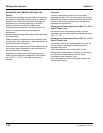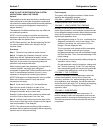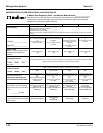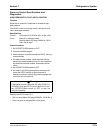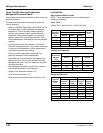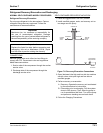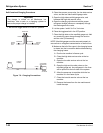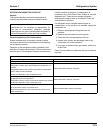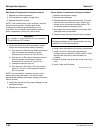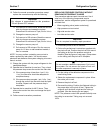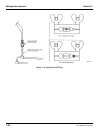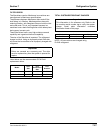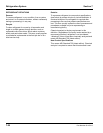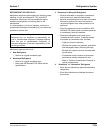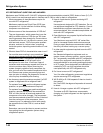
Refrigeration System Section 7
7-24
Part Number 80-1632-3
Mild System Contamination Cleanup Procedure
1. Replace any failed components.
2. If the compressor is good, change the oil.
3. Replace the liquid line drier.
NOTE: If the contamination is from moisture, use heat
lamps during evacuation. Position them at the
compressor, condenser and evaporator prior to
evacuation. Do not position heat lamps too close to
plastic components, or they may melt or warp.
4. Follow the normal evacuation procedure, except
replace the evacuation step with the following:
A. Pull vacuum to 1000 microns. Break the vacuum
with dry nitrogen and sweep the system.
Pressurize to a minimum of 5 psi
(35 kPa).
B. Pull vacuum to 500 microns. Break the vacuum
with dry nitrogen and sweep the system.
Pressurize to a minimum of 5 psi
(35 kPa).
C. Change the vacuum pump oil.
D. Pull vacuum to 500 microns. Run the vacuum
pump for 1/2 hour on self-contained models, 1
hour on remotes.
NOTE: You may perform a standing vacuum test to
make a preliminary leak check. You should use an
electronic leak detector after system charging to be sure
there is no leak.
5. Charge the system with the proper refrigerant to the
nameplate charge.
6. Operate the ice machine.
Severe System Contamination Cleanup Procedure
1. Remove the refrigerant charge.
2. Remove the compressor.
3. Disassemble the harvest solenoid valve. If burnout
deposits are found inside the valve, install a new
harvest valve, and replace manifold strainer, TXV
and harvest pressure regulating valve.
4. Wipe away any burnout deposits from suction and
discharge lines at compressor.
5. Sweep through the open system with dry nitrogen.
6. Install a new compressor and new start components.
7. Install a suction line filter-drier with acid and
moisture removal capability (P/N 89-3028-3). Place
the filter drier as close to the compressor as
possible.
8. Install an access valve at the inlet of the suction line
drier.
9. Install a new liquid line drier.
Continued on next page …
Important
Dry nitrogen is recommended for this procedure.
This will prevent CFC release.
Important
Refrigerant sweeps are not recommended, as they
release CFC’s into the atmosphere.



